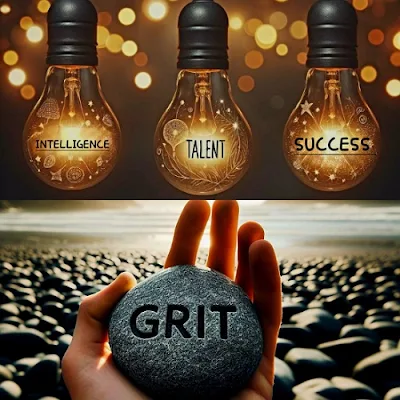Success is often associated with talent and intelligence, but there is another factor that plays a crucial role in achieving one’s potential: grit. Grit is defined by psychologists as the “perseverance and passion for long-term goals”. It is the ability to persist in the face of difficulties, to maintain a positive attitude, and to keep working hard towards a meaningful purpose.
One of the main reasons why grit is more important than talent or intelligence for success is that it predicts achievement and
resilience in various domains. Several studies have shown that grittier individuals tend to perform better and persist longer in challenging tasks, such as academic exams, military training, and sports competitions.For example, a study by Duckworth et al. found that grit was a better predictor of graduation from the US Military Academy at West Point than SAT scores, high school rank, or physical fitness. Similarly, a study by Eskreis-Winkler et al. found that grittier spelling bee contestants advanced further in the competition than their less gritty peers, even after controlling for IQ, vocabulary, and practice time.
These findings suggest that grit enables people to overcome obstacles and achieve their goals, regardless of their innate abilities or intelligence.
Another reason why grit is more important than talent or intelligence for success is that it helps people overcome challenges and setbacks, and pursue their long-term goals with passion and perseverance.
Gritty people do not give up easily when they face difficulties or failures. Instead, they view them as opportunities to learn and improve. They also have a clear vision of what they want to accomplish and why, and they are willing to work hard and sacrifice for it.
For instance, a study by Duckworth and Quinn found that grittier teachers were more likely to stay in their jobs and improve their students' test scores than less gritty teachers. Likewise, a study by Duckworth et al. found that grittier undergraduates had higher GPAs than their less gritty counterparts, especially among those who had lower SAT scores.
These examples show that grit fosters a growth mindset and a sense of purpose, which are essential for success.
Some people may argue that grit is not more important than talent or intelligence for success, because they believe that success depends on factors such as luck, opportunity, or talent.
However, these arguments are not convincing, because they ignore the role of effort and persistence in achieving success. Luck and opportunity may play a part in success, but they are not enough without hard work and dedication.
Talent and intelligence may give an advantage, but they are not sufficient without practice and improvement. As the famous quote by Thomas Edison goes, "Genius is one percent inspiration and ninety-nine percent perspiration" . Moreover, grit does not mean being obsessed or burned out by one's goals.
Gritty people are able to balance their passion and perseverance with their well-being and happiness. They know when to take breaks, seek help, or change strategies, and they do not let their goals define their self-worth.
Therefore, grit is not only more important, but also more beneficial than talent or intelligence for success.
As I condude, grit is more important than talent or intelligence for success, because it predicts achievement and resilience in various domains, it helps people overcome challenges and setbacks, and it fosters a growth mindset and a sense of purpose.
Talent and intelligence are not enough without effort and persistence, and luck and opportunity are not sufficient without hard work and dedication.
Grit is the key to unlocking one’s potential and achieving one’s goals. Therefore, I recommend that you develop your grit by finding your passion, setting your long-term goals, embracing challenges, learning from feedback, and celebrating your progress. By doing so, you will not only be more successful, but also more satisfied and fulfilled. GROW YOUR GRIT


No comments:
Post a Comment
Leave A Comment
Your email address will not be published.